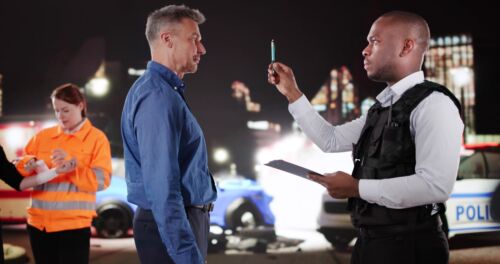What to Know About the DUI Eye Test in Georgia

If you are pulled over for a DUI in Georgia, the police may ask you to perform field sobriety tests. One of these tests is the Horizontal Gaze Nystagmus (HGN) test, also referred to as the “DUI eye test.” This gives law enforcement the opportunity to observe you for signs of impairment. However, since there are many factors that can impact the results apart from intoxication, these tests are not always reliable. If you failed the DUI eye test and were arrested for a DUI as a result, it’s vital to have a knowledgeable criminal defense attorney who can fight the charges against you.
What is the DUI Eye Test?
The DUI eye test is one of three standardized field sobriety tests designed to detect a driver’s impairment by alcohol. It allows law enforcement to assess nystagmus, which can be caused by a high blood alcohol concentration. Specifically, the term “nystagmus” refers to the effects of alcohol on the cerebellum and vestibular system, which can cause involuntary eye jerking or twitches.
What Do the Police Look for During the DUI Eye Test?
There are specific procedures involved with conducting a DUI eye test, and the police must look for certain criteria. If they do not conduct the test in the correct way, you can fail the test even if you weren’t impaired. Importantly, the test should be performed in a well-lit area away from distractions. You must also be asked to remove your glasses, if applicable.
The police must provide you with clear instructions when conducting the test. They will first check your pupil size and any resting nystagmus. They will then hold a stimulus, such as a pen, 12-15 inches from your nose and move it from side to side while looking for the following clues:
- Onset of nystagmus prior to 45 degrees: The officer will observe the angle at which the involuntary eye jerking begins. If it starts before the eyes reach a 45-degree angle, this is an indicator of intoxication.
- Distinct nystagmus at maximum deviation: The officer will look for jerking eye movements when the eye is moved as far as possible to the side.
- Lack of smooth pursuit: The officer will observe whether the eyes are able to follow the stimulus or jerk when following an object, such as a pen.
You are not legally required to perform a field sobriety test if you’ve been pulled over for a DUI. Significantly, refusing to take the test can limit the evidence the prosecution has against you, but it does not prevent you from being charged with a DUI. If the officer smelled alcohol on your breath, observed you driving erratically, or had other probable cause that made them believe you were operating your vehicle while impaired, they may still arrest you. The prosecution can build their case against you based on other forms of evidence, such as the officer’s observations, witness testimony, and video footage.
What Happens if You Fail the DUI Eye Test?
It’s essential to be aware that the DUI eye test is not without its limitations. There can be many problems with the test, and it’s not uncommon for the results to be flawed. In fact, the National Highway Traffic and Safety Administration (NHTSA) found that the test itself was only 77% accurate in determining impairment. Notably, there can be many factors that can affect the test results, apart from intoxication.
Fatigue, certain medications, and various medical conditions can cause involuntary eye jerking during the nystagmus test. Other issues can stem from roadside conditions, environmental factors, lighting, and the way the test was administered by the officer. If the weather conditions were bad, lighting was poor, or the officer failed to follow the correct protocol, the test results may not be reliable. Additionally, if an officer was not trained properly in administering the test, they might misinterpret natural eye movements or fail to take factors other than intoxication into account.
Failing a DUI eye test doesn’t always mean you will be convicted of driving under the influence. A skillful criminal defense attorney will know how to challenge the results of a DUI eye test and argue against its reliability. Depending on the facts of your case, an attorney can question how the test was administered, argue that pre-existing physical conditions caused the inaccurate result, or present scientific evidence to challenge the validity of the test. They may also bring in expert witnesses who can testify about the unreliability of these tests and explain to a jury how factors other than intoxication can cause a false positive result.
Contact an Experienced Georgia Criminal Defense Attorney
If you’ve been charged with a DUI based on the results of a DUI eye test, it’s crucial to have the representation of an experienced criminal defense attorney. At The McCoy Law Firm, LLC, our DUI attorneys have decades of experience representing defendants for DUI matters across Georgia. Based in Cartersville, we serve clients throughout Bartow County, Cobb County, Cherokee County, Gordon County, Floyd County, and Paulding County. Please contact us today to schedule a consultation to learn how we can help.


